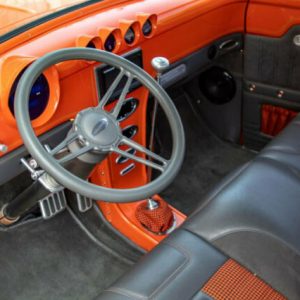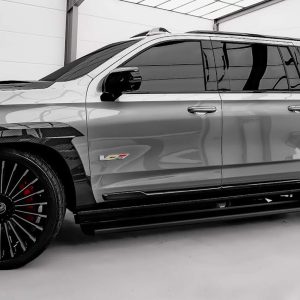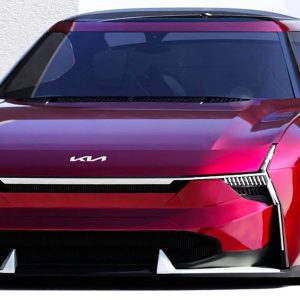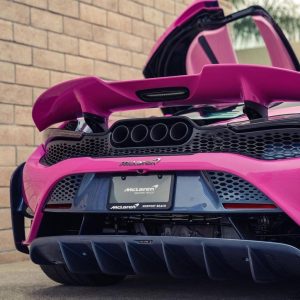There’s still some solid Zoom Zoom to be found in this compact crossover.

Mazda’s no stranger to making driving fun. Between its ever-memorable Zoom Zoom marketing back in the early aughts, and writing the book on harnessing enthusiasm at a reasonable price with its Mazdaspeed era, it has solid pedigree in making getting from A to B way more fun than it really has to be. And that pedigree thoroughly shines through with the 2023 Mazda CX-30 Turbo.
It’s been a long time since Mazdaspeed’s been a thing. As far as its street-going efforts go, it seems to have shed some of this for-enthusiasts-by-enthusiasts image recently in favor of taking on conventional luxury choices like Lexus, Acura, or BMW.
This is why when I heard that the CX-30 Turbo was a hoot to drive on twisty roads, my interest was quite piqued. I wanted to figure out for myself if this was indeed the case, and if Mazda was still in touch with this form of automotive engineering. After a whole week and nearly 600 miles of Southern California motoring, I wasn’t disappointed.

2023 Mazda CX-30 Turbo AWD Specs
The Basics
Entering its third model year, the 2023 Mazda CX-30 represents the brand’s entry-level, gasoline-only crossover. No hybrid or electric option here. On the outside, it’s packaged in a sleek, trim body with a sportier stance and plenty of body cladding. In fact, there’s a lot of cladding, but I think it’s a good overall look that matches its black wheels, stilted ride height, and aesthetic quite well. Mazda’s Soul Red Crystal Metallic paint looks good on anything, too, and my favorite bit about its looks is everything going on with the front bumper, including its crisp, aggressive headlights.
The Turbo AWD Premium Plus trim sits at the top of the CX-30’s pecking order, and with that, you get a comfortable interior that’s nicely adorned in both real and faux leather, dual-zone climate control, and a very comfortable electric driver’s seat with heating. It’s a great place to be for the price, and I really appreciated the fact that Mazda kept the infotainment screen small, up high, and not touchable—it’s very driver-centric. Instead, the UI is similar to BMW’s iDrive in that there’s a clickable wheel and a couple of buttons to configure settings, as well as connect to Apple CarPlay, Android Auto, and Bluetooth. It took an afternoon or so to figure it out, but after that, anyone could quickly become accustomed to it.
In addition to the CX-30’s pleasant soft-touch surfaces, Mazda’s done a great job with its plastic switchgear, which has a very substantial, quality feel. Unlocking the doors makes a very satisfying, solid click, and the gear selector has a smooth, quality feel to it as well. You can tell the brand put a lot of thought into these details.

The base CX-30 is powered by a naturally aspirated 2.5-liter four-cylinder that makes 191 horsepower and 186 lb-ft of torque and features the brand’s i-Active all-wheel drive as standard. However, my Turbo model adds forced induction to the mix, enabling it to produce as much as 250 hp and a whopping 320 lb-ft of torque on 93 octane—it makes 227 hp and 310 lb-ft on 87.
Driving the Mazda CX-30 Turbo
Around town and on the highway, the CX-30 was a pleasant little daily rig. The ride felt solid and connected, but in no way harsh, and its dampers did an excellent job of filtering out pretty much any everyday road imperfection. Steering gained good firmness at speed, especially in Sport mode, and lightened up for easy low-speed maneuverability too.
Overall visibility was good, but its massive C-pillars meant that gazing over my shoulders to check blind spots was tough, and I had to largely rely on blind spot monitoring for any sudden lane changes. Additionally, its front and rear parking sensors and 360-degree camera were very nice to have and effective in the fight against curbing its flat-faced 18-inch wheels.
The CX-30’s turbocharged Skyactiv-G 2.5-liter four-cylinder is a peach, even if it’s not the most enthusiastic powerplant up top. For how it’s geared, it had ample shove in any scenario, and really takes off from the line. This same sturdy torque made it a beast on the highway, too. Its six-speed automatic gearbox is a blessedly conventional box, too—no CVT here—and shifts plenty quickly. Why can’t more non-ZF drivetrains shift this well?

When the powertrain, drivetrain, and a heavy right foot combine forces, the 3,472-pound CX-30 Turbo will clock in a zero-to-60-mph run of 5.8 seconds.
In spite of wearing normie-spec 215/55/18 Bridgestone Turanza rubber on its handsome black wheels, the CX-30 was a genuine hoot to drive on fun roads. There was some body roll, but considering it’s a crossover sporting conventional passive dampers, it had no problem maintaining near-sports-car-level speeds through some fun, winding sections of Angeles Forest Highway. And on a cold and mildly drizzly day, too. It kept a pace similar to my experience last year on a hot, Spring afternoon in the Toyota GR86.
To make this experience even more surprising, the CX-30 possesses MacPherson front and torsion beam rear suspension. This kind of basic setup typically results in a very meh-level driving experience, but the CX-30 was anything but meh.
Turn-in was a bit vague and a tad delayed, sure (better Summer rubber would undoubtedly solve most of this), but overall grip was excellent, and the brake pedal felt nice and solid. Then, the same steering that felt great tooling around town loaded up and provided a surprising amount of feedback. The biggest fly in the ointment might be the brakes themselves which overheated and faded quickly. Though, given that this is a sub-$40,000 crossover, the fact that it goaded me on to drive in a manner in which that even happened is probably a compliment unto itself. I had to keep reminding myself that it was neither a sports car nor a high-end crossover made by the likes of Porsche or Mercedes-AMG, which tells you all you need to know about the CX-30’s canyon manners.
The Highs and Lows
The CX-30 Turbo’s engine has excellent torque and returns good economy if you’re able to keep your foot out of it, but it’s not the most inspiring powerplant. The revs cut at around 6,200 rpm, and even then, it’s not a fan of venturing past 5,000 anyway. Then, when you can hear it, it doesn’t make a very pleasant noise—which isn’t a knock against its turbo-four design, as the Hyundai Elantra N and Veloster N make excellent rackets.

This car’s driver-centric driving position also felt slightly more confined than I’m used to in vehicles of this size. Combined with the side windows’ narrow height and compacted rear glass, it had a more sporty, down-in-it feel that felt a bit cavernous, which some drivers might not like.
Nonetheless, overall interior space was very good as my tall stature had plenty of head, shoulder, and leg room, and there was a respectable amount of room behind my seat as well. Not great, but more than I thought there’d be. A friend mentioned that the interior space felt the same as the 2010-2014-generation Mazda 2—a car that I used to own and definitely miss—and I agree. The CX-30 is dimensionally much larger, though not overly so for its compact crossover class.
Mazda CX-30 Features, Options, and Competition
To get behind the wheel of the most base Mazda CX-30 with all-wheel drive and no turbo, it’ll cost you at least $24,225 for the S trim. Mazda’s i-Activsense suite of advanced driving assistance technology is standard, as are LED headlights, and rain-sensing wipers. As you ratchet up the CX-30 in exterior and interior add-ons, such as a roof rack, more interior leather, and more handsome 18-inch wheels over the base’s 16s, you pass five whole trims before reaching this Turbo Premium Plus tester’s $36,675 base sticker.
If it were my money, I’d opt for the slightly lower Turbo Premium at $35,175, which sheds some minor luxury accouterments but still has everything that makes it a massive joy in the corners and on the highway.

In the context of subcompact crossovers, the CX-30 Turbo actually exists in a bit of a niche. It’s notably more expensive and powerful than its mainstream rivals in the Toyota Corolla Cross, Honda HR-V, and Hyundai Kona, but undercuts most of the luxury options (especially realistically-specced ones you’d actually find on a dealer lot) such as the Mercedes-Benz GLA 250, BMW X1, and Lexus UX. For what it’s worth, that Lexus is similar in the sense of being fun to drive but doesn’t possess the same level of torque-filled, turbocharged thrills. The new X1, meanwhile, narrowly out-accelerates this Mazda but starts at $40,000.
Fuel Economy
According to the EPA, the CX-30 Turbo will return as much as 22 mpg city, 30 mpg on the highway, and 25 mpg combined. This is just about the same as the Mercedes, noticeably lower than the BMW, and significantly lower than the Hyundai, which bests the bunch in city economy.
I achieved an average economy of 26.5 mpg over seven days and nearly 600 miles of SoCal driving, beating out the EPA’s figure.
Value and Verdict
The 2023 Mazda CX-30 Turbo AWD is a first-rate choice in the ever-expanding compact crossover field. It stands out by offering great interior comfort and amenities, good overall tech, and a top-notch driving experience, all in a fully loaded package for less than $38,000.
It’s all wrapped up in a handsome, athletic shape, and while it appears dimensionally large, that sub-3,500-pound curb weight with all-wheel drive bolted up is downright light. This makes me wonder if Mazda was especially cognizant of curb weight during R&D like it was known for in the past. After all, low weight is a very effective way to make something handle well, an area that the CX-30 Turbo thoroughly aces.
When it comes to giving more luxurious automakers a run for their money, Mazda absolutely accomplishes its goal in this stylish, high-riding hatchback.





